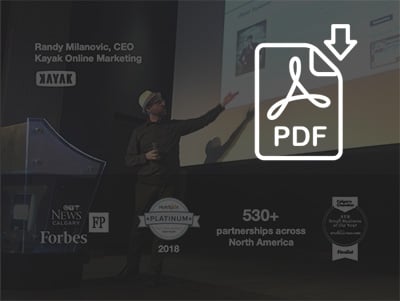
I had a chance to speak with a group of my peers recently. Rather than talk with them about the latest search engine optimization trends or lead generation tactics, I asked them a very simple question: were they vendors to their clients, or partners?
To some, this might have seemed like a silly thing to ask. But, I really wanted them to think about it.
Traditionally, a “partner” in your business is someone who has a financial stake in the bottom line, not an outsider who provides goods and services.
In the traditional outsourced business model, a business owner or executive sets a direction for their company and follows through with the help of employees or outside providers. Vendors, on the other hand, bring different ideas and solutions to these decision-makers, hoping to entice them with an offer or concept that’s too good to pass up.

This is such a normal and accepted way of doing things that it’s rarely ever scrutinized. When you stop and think about it from the outside, though, an interesting dynamic starts to reveal itself: vendors sell stuff, often whatever clients are buying.
Everything is based on the idea of conducting a transaction.
Or, to put that in a slightly different light, the vendor and the client have different goals. If the vendor is good at selling, they can make money at the client's expense. In fact, that can happen even if the vendor is trying to do the right thing.
With that understanding in mind, let’s go back to the role of a partner. In the classic definition, a partner is someone who has invested time, money, or expertise in the company and wants to see it succeed. What if an outsider – a service provider who used to be thought of as a vendor – started acting like a partner.
If that were possible, the partner wouldn’t sell the client on anything; instead, they would point the client towards solutions, wherever they might be. IN effect, provide leadership and guidance, directing resources towards outcomes rather than what was in the vendor's warehouse.
Most importantly, the partner would profit from the success of the business, not the sale of any one package or deliverable.
With those definitions out of the way, I asked the audience: “how many of you can truly say you are working as partners with the companies you serve?” hands still came up, but there was a noticeable hesitation to the movement.
Those who are Kayak clients or regular blog readers will probably recognize where I’m going with this. In the past eight years we have rebuilt our business from the ground up by following the philosophy that we partner with our clients on strategy instead of just selling them 'things', like website design, SEO, and other deliverables.
We still do those thing, but in collaboration.

I’ve talked about the benefits of a partnership approach for our clients in other recent posts. So, I won’t spend time on them here except to say that we are able to better align our work with their goals, help them to attract better leads, and help them feel good about their decision to engage us.
Instead, today I want to reiterate the idea that it isn’t just the marketers and business leaders we work with who come out ahead in a partnership-style working arrangement. When clients know we are committed to seeing them succeed, they share more with us than they would have if they were simply buying a one-off project, product, or service.
In turn, we invest more time and energy into them because we know we are both in it - as partners - for the long run. With better insights and solid commitment, it’s easier to create campaigns that appeal to the buyers they want to reach.
 All of this means results improve over time, and at every level. SEO is easier, as is social engagement. It isn’t that we are using super-secret techniques. It’s just that we take our time to do things right because we aren’t pressed to generate quick or inexpensive fixes. We know will get paid well when our clients are doing well.
All of this means results improve over time, and at every level. SEO is easier, as is social engagement. It isn’t that we are using super-secret techniques. It’s just that we take our time to do things right because we aren’t pressed to generate quick or inexpensive fixes. We know will get paid well when our clients are doing well.
And, by the way, we do get paid more. People gladly pay for value when they see what we are capable of accomplishing together.
We coach them on what they need to know to deploy their own campaigns, so every invoice is an investment in growth, not a bill that’s being paid because we are holding someone’s content or website hostage. That makes our client relationships go more smoothly. It's obvious that everyone is on the same side.
When we work as partners, our clients win and our business gets better. A lot of the stress that exists in agencies where people are always selling just doesn’t make its way into our office. We feel good about the work we are doing, and the people we serve love us for it.
So, I’ll ask my colleagues once again: are you a vendor or a partner? And, are you sure you don’t want to re-position yourself going forward? If you find yourself on the client side, do you prefer a vendor or a partner to help you accomplish your mission?
Topics: Digital Strategy, Content Optimization, All Articles